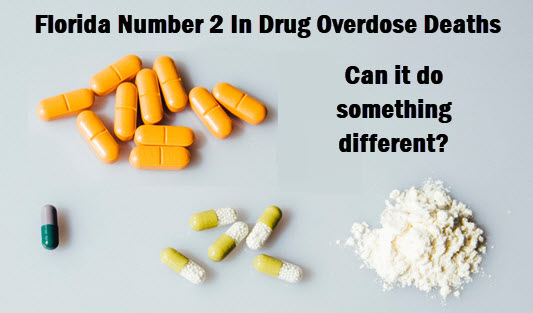Florida No. 2 In Drug Overdose Deaths
Can It Do Something Different?
Posted May 23, 2022 10:18 am

Photo: Markus Spiske via Unsplash |
Columbia County Observer graphic
Florida is struggling. The current wave of death from drug overdoses has the numbers climbing. Could Oregon's revolutionary approach of decriminalization be a solution for Florida?
Florida has one of the worst drug problems in the nation. In 2020, Florida ranked second only to California for drug overdose deaths, with 7,579 people dead from a drug overdose, an increase of 37% from 2019.
In 2020, while the whole country saw a spike in drug overdose deaths of almost 30%, Florida saw the worst of what was already a record-breaking tragedy.
Oregon is in the midst of its own big problems with addiction. Oregon ranks worst in the nation regarding the percent of its population with illicit drug use disorders at over 9% of teenagers and adults in 2021. Oregonians have been the least likely in the nation to find treatment.
To fight its drug problem, Oregon is taking a new approach that has been met with a mixture of nationwide criticism and interest.
In February of 2021, Oregon made headlines when the state passed Measure 110, decriminalizing low-level drug possession and increasing funding for substance use disorder services. By utilizing tax money from the sale of recreational cannabis, the state invested $31.4 million in service providers, including treatment, harm reduction, peer support, housing, and employment support services.
As Florida's drug problem grows, leaders should be looking to other states like Oregon to see what's working and what isn't.
What Oregon is doing appears to be working. There were 60 percent fewer total drug arrests in the state over the ten months after Measure 110 went into effect than the previous year's same period. That 2020 period saw 9,100 drug arrests in total, which was a reduction of almost 5,500 arrests. More than 16,000 Oregon residents have already accessed services funded by Measure 110. Almost 60% of them have received harm reduction services, like sterile syringes, naloxone, and safe sex supplies. And about 15% of those helped received assistance with housing needs, with 11% receiving clinical screening.
Like the rest of the country, the pandemic was largely to blame for accelerating Florida's drug problem. But the state's struggles with addiction were already a serious issue that needed attention.
Covid-19 added a new set of challenges that played right into the problem. People experienced more stress and were cut off from vital prevention and treatment services. These and other factors created a perfect storm for substance use and more death.
In the Tampa Bay area, the overdose rate was 23 deaths out of every 100,000 people amid the pandemic. That rate was 9 percent higher than the rest of Florida and 50 percent higher than the national average during the same period.
Another report shows that during the height of the COVID-19 lockdown, drug overdose deaths rose by 70 percent in Central Florida compared with the same time a year earlier. And it's not just that more people abused substances -- it's what kind.
According to Addicted.org, fentanyl has become more accessible and is now the leading cause of death among adults aged 18 to 45. Despite efforts to prevent smuggling, Florida is a target for traffickers who utilize its extensive shoreline to evade authorities. As a result, the state is often the first to be hit by new illicit drug trends like fentanyl.
The war on drugs is a losing battle.
We've tried to discourage substance abuse by attaching stiff penalties to drug possession and consumption for decades -- the numbers have only worsened.
The Oregon experiment is a completely different approach that shows promise. The first step in changing how we treat people who struggle with addiction is to remove the punishments associated with substance use disorder.
Florida can't continue its tired approach to substance abuse that we know doesn't work.
Much like Oregon, Florida is in desperate times.
Unless Florida changes course, don’t expect the results to change.
-----
Ramsey Darwish has been working in the field of Substance Use Disorder for over 15 years. He uses his experience to provide insight into current issues surrounding addiction and recovery.

 By
Ramsey Darwish
By
Ramsey Darwish